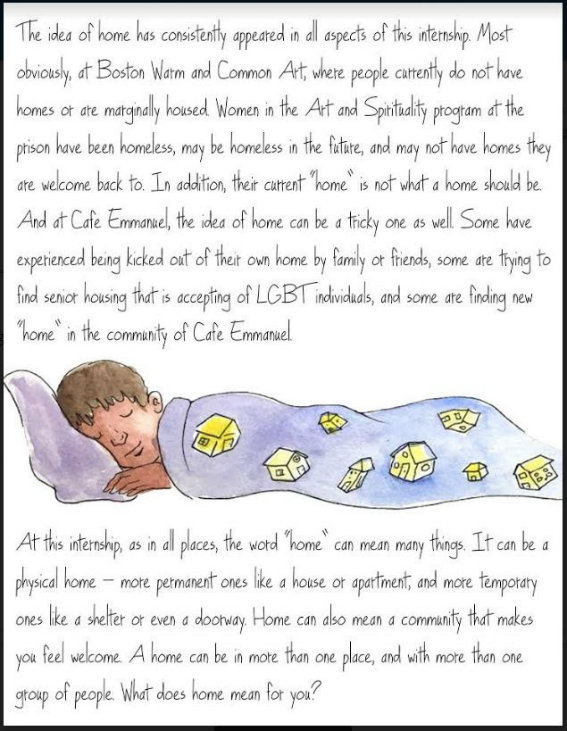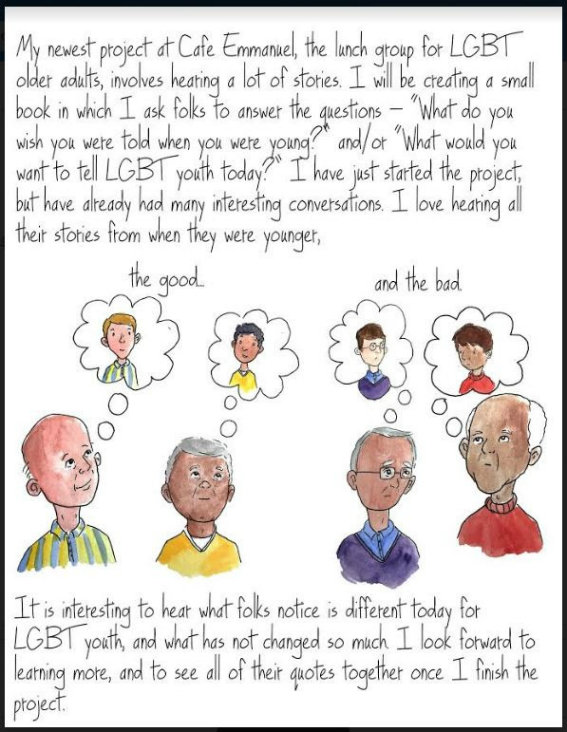Tag Archives: LGBT
In Honor of Trans Day of Remembrance
Welcome our new expressive-arts interns!
I am Wanyi, a second-year graduate student studying Art Therapy at Lesley University. Having grown up in Taiwan, I had the chance to learn fine art for my bachelor’s degree and was fortunate to have lived and taught in three different countries. During those time periods, I found the therapeutic power of art through leading art-making sessions in my communities. To further my knowledge in using art as a therapeutic medium, I came to the US to learn from the best.
Biblical Marriage
Epiphany 2C, 16 January 2022. The Rev. Pamela L. Werntz
Isaiah 62:1-5 . For the Lord delights in you and your land shall be married….So shall your God rejoice in you.
1 Corinthians 12:1-11. Now there are varieties of gifts…of services…of activities…for the common good.
John 2:1-11. The first of his signs…revealed his glory…his disciples believed in him.
O God of Justice, grant us the strength, the wisdom and the courage to seek always and everywhere after truth, come when it may, and cost what it will.
The readings appointed for the second Sunday after the Epiphany in the third year of our lectionary cycle always provoke a rant inside my head that threatens to come out in the pulpit in an Andy Rooney style of commentary (for those of you of a certain age). But it’s not a rant about the lectionary (this time). This time it’s a rant about biblical marriage. Now if I asked random people walking up Newbury Street what the definition of biblical marriage is, I feel confident that, no matter what their religious background, most would respond with some version of one man and one woman. They probably wouldn’t know that marriage descriptions in biblical times, which span more than 1,000 years, differ widely (and even wildly) in terms of expectations: of polygamy or monogamy; parent-arranged or husband-initiated; endogamy or exogamy (that is, within one’s clan or outside of it); the obligation for a man to marry his brother’s widow; not to mention the estimations of perceived time until the end of the world. There are also major considerations and differences in the Bible when it comes to property, procreation, strategic political alliance, and divorce. A man “taking” a wife literally means procuring, buying, and the acquisition is called betrothal. And Paul writes to the church in Corinth, “Now to the unmarried and the widows I say: It is good for them to stay unmarried.” Continue reading
The Harvest of Righteousness
Advent 2C. 19 December 2021. The Rev. Pamela L. Werntz
Baruch 5:1-9 Take off the garment of sorrow and affliction and put on the robe of righteousness.
Phillipians 1:31-11. And this is my prayer, that your love may overflow more and more with knowledge and full insight to help you to determine what is best, so that in the day of Christ you may be pure and blameless, having produced the harvest of righteousness that comes through Jesus Christ for the glory and praise of God
Luke 3:1-6 All flesh shall see the salvation of God.
God all merciful and all compassionate, grant us the wisdom, the strength, and the courage to seek always and everywhere after truth, come when it may and cost what it will.
As I said last week, Advent is a season for communal and institutional reflection and repentance, for collective atonement and reparations. Our readings for this second Sunday in Advent are so full and big with calls for repentance and reparations; it is almost as if they are pregnant with possibility. The prophet Baruch and the evangelist Luke are both reminding their hearers about the words of the prophet Isaiah. And Luke draws a picture of John the Baptist that is just like the prophet Jeremiah, consecrated before he was born, and just like Elijah by the Jordan in the wilderness. Luke also has already explained that John’s work was so closely related to Jesus’s work, their purposes were so akin to one another, that it was as if they must have known one another before they were even born. Continue reading
Bearing One Another’s Burdens
Proper 9C
July 7, 2019
Galatians 6:1-16 [You all,} bear one another’s burdens, and in this way you will fulfill the law of Christ.
Luke 10:1-11, 16-20 Peace to this house.
O God of gentleness and redemption, grant us the strength, the wisdom and the courage to seek always and everywhere after truth, come when it may, and cost what it will.
This morning I want to focus our attention on our reading from Galatians, because we aren’t going to hear from this beautiful letter for another three years, and it’s one of the most important books in our Second Testament, theologically and ethically. We don’t know for sure, but it might be the second oldest document in our Christian scripture, probably written just after the year 50. Galatia was a large territory in what is now known as central Turkey. Paul was writing to a group of communities, not just to a gathering in one town or city. Here is the oldest document that asserts justification by faith and not works (works, in this case, mean circumcision for men and keeping dietary commandments – it doesn’t mean “good deeds”). The thing about justification by faith, though, is that, according to Paul, it’s the faith of or from Jesus Christ, not faith in Jesus Christ that saves us. It was Jesus’s faith, not his followers’ faith, and that’s a good thing, because as a group, we aren’t all that faithful. As far as I can tell, Paul never meant to suggest that we don’t have work to do in response to Jesus’ faith in God and in his followers.
Continue reading
This Kind of Community
Third Sunday after Pentecost (5B), June 10, 2018; The Rev. Pamela L. Werntz
2 Corinthians 4:13-5:1 So we do not lose heart.
Mark 3:20-35 Whoever does the will of God is my brother and sister and mother.
O God of glory, grant us the strength, the wisdom and the courage to seek always and everywhere after truth, come when it may, and cost what it will.
Sometimes the lectionary just puts much too much on a preacher’s plate. This morning feels like something of a dog’s breakfast – a confused mash up of 1 Samuel, 2 Corinthians, and a peculiar section of the Gospel of Mark. (Well it confuses me, anyway.) The story in 1 Samuel of Samuel’s warning that the people’s desire to be like the other nations and have an autocrat is going to backfire (the more things change…). Then we hear the Apostle Paul’s encouragement that enduring affliction is going to be rewarded by God. According to the notes for this passage in The Jewish Annotated New Testament, Paul was articulating a Rabbinic Judaism idea that overcoming adversity reveals the presence of divine power, and Paul was taking it one step further asserting that affliction of those that God loves assures their greatest reward in the next life. [1] I’d say that idea has backfired too. It’s one thing to offer encouragement and comfort to not lose heart, which I think is what Paul was doing. It’s quite another to start glorifying suffering. Continue reading
The Temple in a Church
Celebrating 13 Years of Love & Friendship
Sunday, October 15, 2017; Rabbi Howard A. Berman
This morning, in my first sermon of both this new church program season, as well as our Jewish New Year, 5778, I want to share some reflections on a very special shared milestone for all of us — of both Central Reform Temple and Emmanuel Church. The New Year, that we have just celebrated, is indeed a momentous one for all of us of the Temple, as we mark the 13th Anniversary of the Founding of our Congregation! Just three weeks ago, our celebration of Rosh Hashanah inaugurated what we are calling our Kehilat Mitzvah Year– an egalitarian Hebrew variant on the Bar and Bat Mitzvah 13th birthday tradition, which means “ A Community of the Commandments.” In this very symbolic way, we seek to frame and reaffirm many of our Temple’s core values as we celebrate this milestone. Continue reading




